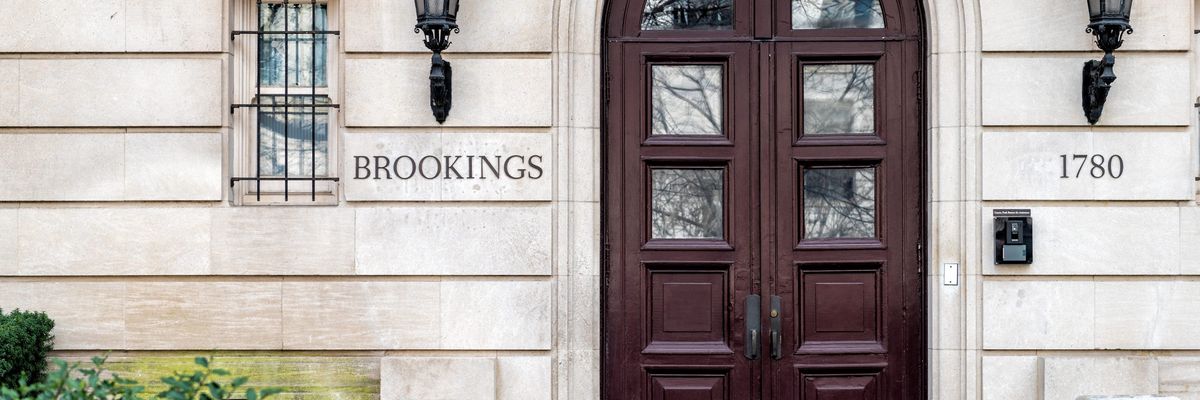Foreign governments gave the top 50 think tanks in the United States $175 million to influence Washington policy and public opinion from 2014 to 2018, but don’t for a second think that is the extent of their giving.
In fact, since there is virtually no transparency when it comes to foreign influence in our think tanks, that number could easily exceed $500 million, noted Ben Freeman, director of the Foreign Influence Transparency Initiative at the Center for International Policy, which released its much anticipated study of think tank funding on Wednesday.
“This is a floor, not a ceiling,” he said of the total figures. There are a number of reasons for this. First, think tanks are not required by law to disclose anything about their donors, foreign or otherwise, period. Freeman found out the hard way how difficult this would make his task when he set out to dig a year ago. The New York Times had already laid some important groundwork in this area in 2014, identifying some $92 million in international funding to U.S. think tanks from 2011-2014.
Freeman’s team expanded the scope from 28 think tanks to 50, and ascertained funding from 80 foreign governments, up from the Times’s list of 64 government sources. Combing through 990 tax forms, open source material like investigative news reporting, and good old-fashioned phone calling, the painstaking process eventually paid off.
The picture that emerged was that foreign sources are investing a ton of money to get a hand in our foreign policy. In addition to direct lobbying and investing in academic institutions, foreign interests see think tanks as a way to shape legislation on Capitol Hill, turn public opinion, and pad budgets for military and other aid assistance. The list of countries include allies and democracies with benign missions, but also “authoritarian regimes whose aims often diverge significantly from U.S. interests,” according to the report.
A few highlights:
- The top five U.S. recipients for foreign funding were the World Resources Institute ($63 million), the Center for Global Development ($37.5 million), Brookings Institution ($27.3 million), Atlantic Council ($12.1 million) and the Aspen Institute ($8.4 million).
- The top five donor countries were Norway ($27.6 million), United Kingdom ($27.1 million), the United Arab Emirates ($15.4 million), Germany ($12.5 million) and Sweden ($9.3 million).
A few major elephants in the room — countries with typically outsized influence operations, like China, Saudi Arabia, and Israel — didn’t even crack the top 20.
Here is where the second major obstacle comes in: there is no consistency in self-reporting among think tanks. For example, seven of the top 50 think tanks, including the Wilson Center and the Hoover Institution, do not publicly disclose their foreign donors. Meanwhile, only two think tanks — the Chicago Council on Global Affairs and the Center for Global Development (number two on the list) — disclose all of them, with exact amounts. Meanwhile the rest of the organizations either disclose their donors without funding totals, or disclose their donors with funding ranges only, like “$2 million and above.”
“There was a frustrating level of different transparencies,” said Freeman, “there was such an incredible range here.”
Which means that the $8.5 million listed for Qatar’s total contributions to think tanks could be way off base because its main beneficiary, the Brookings Institution, doesn’t disclose the exact dollar amount of their grants, only ranges.
Furthermore, Freeman pointed out that countries typically find ways to fund think tanks surreptitiously through private organizations, which is maybe why the list seems a bit top heavy with non-controversial democracies and allies. They don’t have much to hide. U.S. institutions may not want to take money from Saudi Arabia or China outright — especially as national headlines like the Saudi-directed Jamal Khashoggi murder or the Chinese Uighur prisoner camps are shifting public opinion. But there is nothing preventing one of those countries from funding a third party organization that then funnels the money to a (perhaps) unsuspecting think tank. “A lot of [funders] are trying to make their foreign influence as clandestine as possible,” Freeman noted.
So why should we care? Because these countries are buying influence and without think tanks disclosing completely what that influence is, citizens and elected officials cannot take what they are peddling at face value. Think tanks generate reports and white papers, they cultivate future administration officials, their experts testify on critical issues before Congress and in the media, and they help legislative staff craft bills. Without disclosure it is impossible to know what foreign bias might be at work.
Is there obvious quid pro quo? The report details a number of cases which indicate that funding bought favorable reports that could have an impact on policy, U.S. contracts, aid, and “silence” when it comes to criticizing a funder-nation.
“Most funding comes with explicit strings attached,” Freeman’s report adds, “like writing research reports or hosting public events about specific topics. …They place constraints on what a think tank can and cannot do.”
The Foreign Influence Transparency Initiative suggests a simple fix for all of this: require that organizations disclose not only their donors, but exactly how much they are getting. This would let the people decide whether or not to buy what these experts are selling.
“The issue isn’t about the funding itself,” Freeman said. "Think tanks that are conducting truly independent and objective work should have no qualms disclosing their foreign donors. The more think tanks try to keep that foreign money secret, the more cause we have to question how it is influencing their work."
















